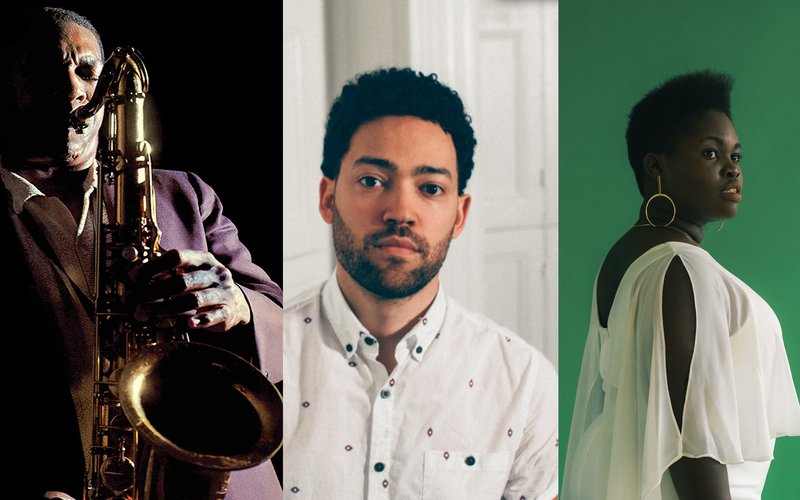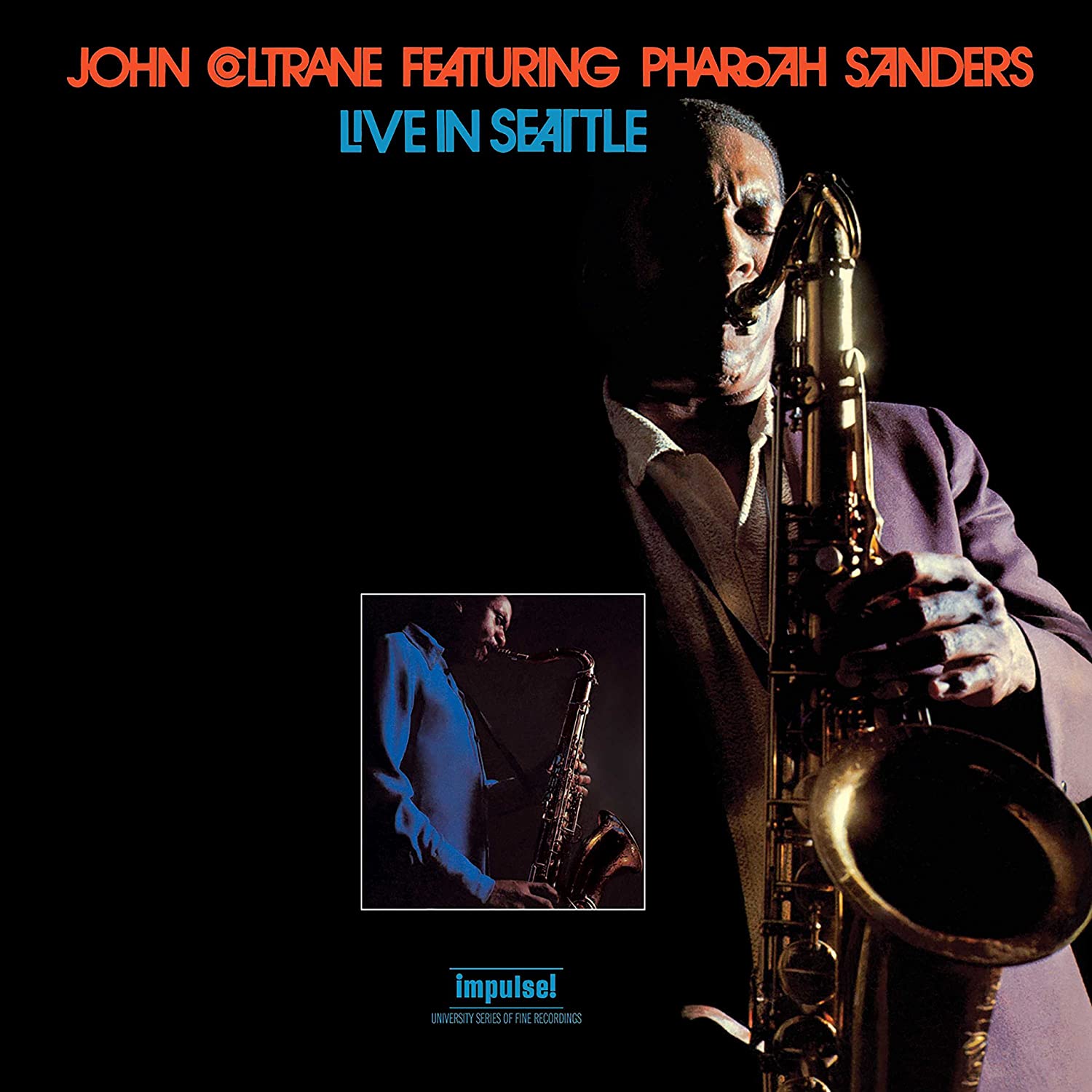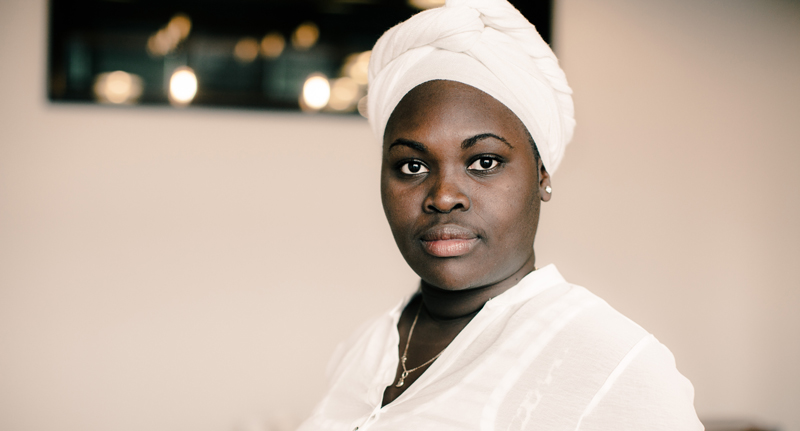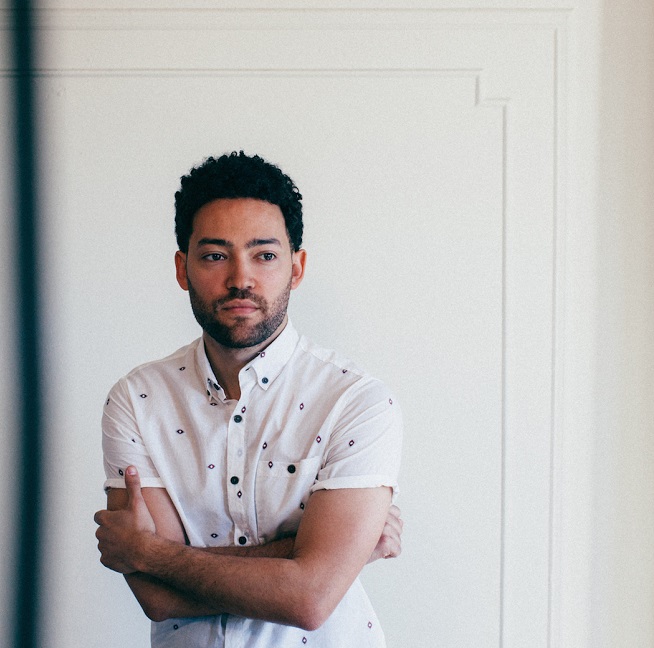
Each month with In Our Headphones, members of KEXP's Digital Content team share the music that's resonating with them right now. For this installment, in conjunction with International Jazz Day, a few of the team members share their reflections on jazz music in their personal rotations.

Almost every Sunday morning, my girlfriend’s basement condo becomes filled with the smell of coffee brewing and the sound of jazz pumping through the air.
By this point in our relationship, it’s pretty routine. She’ll sleep in, my restless mind won’t allow me to stay in bed, and I’ll get up. I brush my teeth, take a shower sometimes, put my clothes on. Maybe empty the dishwasher and clean the counters or take her dog on a walk. Maybe read one of the four or five books I’m making my way through at any given moment, maybe pull out my Black Power Tarot Deck and run a spread. As bountiful as my options are in the minutes or hours before my girlfriend ambles out of bed, the inclusion of coffee and jazz is non-negotiable.
It took me a long time to really get into the art form; I used to half-joke that I was putting it off until my forties (which really aren’t that far away anymore). Truth be told, I was a little intimidated by how much history, how many artists, how much recorded music there was that I knew nothing about. As curious — nay, obsessive — as I am, it was daunting to embark on an education which will more than likely last the rest of my natural life. But the music I had firm footing in was always adjacent to the genre. I’ve been listening to hip-hop music since the womb. As a punk rocker by religion, I pray to Sonic Youth when times get tough and I’ve studied No New York like I could somehow get an MFA in no wave.
Maybe Portland’s Lithics and my coverage of their wonderful music is what really started these Sunday jazz sessions, deep in the midst of an ongoing period of quarantine. Perhaps it was my musician friend imploring me to Listen to More Jazz years ago. Whatever the case may be, I finally let go of my procrastination and became one of those music fans who’s Really Into Jazz, to the point where I’m randomly searching Discogs for a Near Mint copy of John Coltrane’s Live in Seattle (one of many posthumous releases from the legendary musician) when Very Good+ copies are going for $75, even though the compact disc version is the behemoth which earned the document its reputation.
Word has it that the Penthouse Jazz Club, in 1965 perched on 1st and Cherry, was full but not quite sold out. Word has it that McCoy Tyner and Elvin Jones were on their way out of Coltrane’s much-ballyhooed “classic quartet,” befuddled by the idea of free jazz, writing it off as just noise. But there’s a confrontational dissonance to the approach of arguably the finest player to ever pick up a saxophone. It captured the essence of punk long before the idea of punk was a germ in anyone’s brain. Among the members Coltrane happened to invite to play their Seattle gig was Pharaoh Sanders, a counterpoint for that very short argument of, “Who is the greatest saxophonist of all-time?”
Word has it that the day after this September 30, 1965 gig, Coltrane brought his band (along with Seattle jazz stalwart Joe Brazil) to Lynwood to record Om, widely regarded as his worst album. (In my opinion, it simply captures the essence of spirituality in all its chaos and messiness. Spirituality is not as linear and neat as organized religion would have you believe it is.) The improvisational aspect of jazz is one of the most spiritual iterations of music there is — the idea of the journey without the roadmap, the practice of going on stage every night with no idea where you’re going to end. Free jazz especially captures the essence of spiritual odyssey, because it all comes from intuition and experience. An artist is only limited by the scope of their imagination.
Opener “Cosmos” starts with a solo which has burned itself into my brain, a fluid and melodic counterpoint to the assertion that free jazz is violently non-musical, which returns in various points over the course of the album’s two-hour runtime. The saxophones of Coltrane and Sanders sing, scribble, and scream all over center stage while the dexterity of Tyner, Garrison, Jones, and Donald Garrett are also on full display. A full range of tonal and narrative shifts burrow into and sprout out from the music; even if you separate the 36-minute epic “Evolution” from its preceding and subsequent pieces (including the equally sprawling 34-minute closer “Afro-Blue”), it’s as complete an experience as live music gets.
Depending on how you take it in — whether you put it on as background music which frequently demands attention or through intentional listening — Live in Seattle can be a profound, even punishing, test of patience. The performance challenges conventional ideas of music composition; the album a defiant rebuke against being placed in a traditionalist box after the dust settled on the revolutionary A Love Supreme. It captures fundamental aspects of how I approach my work and really, my life. Two cups of coffee, sometimes a little weed, and no blocks or boundaries from the fine art of self-expression.
— Martin Douglas

When Daymé Arocena released her first album, Nueva Era, in 2015, she also won the Juno Award for best jazz album for being a member of another band from the genre, Mequeque. Daymé was born and raised in Havana where, from a very young age, she was accepted into one of the most prestigious music schools in Cuba, becoming a singer, arranger and choir director. In her first album, she lays the foundations of her own style, embodying the future of Afro Cuban Jazz. The rest of her albums were precise evolutions of that first approach, One Takes from 2016, Cubafonia from 2017, and my favorite, Sonocardiogram, from 2019.
In Arocena's music we see how jazz achieves exquisite forms in Cuban territory. This romance is historic because, within the Latin Jazz genre, there are two huge families: Afro Cuban jazz and Afro Brazilian jazz. I would contribute a third position to this map that has forgotten a vital South American piece: Argentine Tango and the figure of Piazzolla who made his love of jazz a new subgenre in this popular Argentine music, giving way to Nuevo Tango and its variants.
There are tons of musical futures ahead of the new generation of Latino artists who have incorporated jazz into their lives and music. You can hear some of them in our special Jazz broadcast of El Sonido from April 26th. There are also unforgettable figures who prepared this infinite and spectacular path called Latin Jazz.
Afro Cuban Jazz is the earliest form of Latin Jazz and was created in 1943 with the song "Tanga" composed by Mario Bauza and recorded by Machito and his sister and singer, Graciela. Machito was the one who popularized one of the biggest families of the genre, Cuban jazz. In the case of Afro Brazilian Jazz, we have to travel to South America and talk about Bossa nova as a genre that involves jazz formulas and fuses them with its traditional music. We should also mention Antonio Carlos Jobim and João Gilberto. But also, we should talk about the limitations of the term "Latin Jazz". The term leaves in its margins the most avant-garde music such as Airto Moreira and Hermeto Pascoal.
Celebrating a musical genre like Jazz is to celebrate a formula of musical liberation that is many, many decades old and that crossed countries, languages and cultures, infiltrating the depths of contemporary popular music to the present day and beyond.
– Albina Cabrera

Taylor McFerrin sits alone behind a Fender Rhodes piano. The room is empty, save for a sound engineer stowed away in some dark corner. I’m next to my wife and her bandmate, the three of us huddled on a bench and daring not to make a sound. The last gloaming of the evening sky shines through the stained glass windows onto the beer-stained floors. We sit mesmerized as McFerrin improvises on the keys, creating impossibly beautiful melodies out of thin air. A precursor to the transfixing performance he’ll give later that night when the room is filled with people.
Some albums I grow to love after spending innumerable hours wrestling with the music, others I find myself elated on first listen. But there are those rare and exciting moments where I’ll feel pulled to an album – like there’s some unseen magnetic force pulling at my soul. Maybe it’s some sort of musical fate. When McFerrin released Early Riser in 2014, I felt that draw before ever hearing a note. And when I did put it on, it was instant confirmation as the cryptic tones of “Postpartum” wove through my headphones. Eerie distant echoes and feedback, the low heartbeat pulse of a kick drum, and four notes of the keyboard climbing in what will be a prolonged build that will eventually reach a truly insane climax of synthesizer madness. All along McFerrin repeats a mantra – “I want to love you, but something’s in the way.”
I had suspicions but didn’t immediately realize that McFerrin was the son of Bobby McFerrin, the vocalist savant who reached pop immortality with his hit “Don’t Worry, Be Happy.” The elder McFerrin’s appearance on the album’s penultimate “Invisible/Visible” should’ve made it even more obvious. And while I can’t help but speculate what musical genetics must be at play here (Taylor’s sister Madison McFerrin is also a wunderkind musician as well), Taylor feels like an artist informed by the greats but distinctly his own. His alignment with Flying Lotus’ Brainfeeder label is a co-sign that certainly didn’t hurt. Even still, with album guests including Robert Glasper, Thundercat, Marcus Gilmore, Nai Palm, and Emily King, McFerrin’s musicianship always feels like the star of the show.
Early Riser became an obsession for me, which I extended to my wife and bandmate. When I finally tracked down a vinyl copy, I’d throw it on the turntable after their living room band practices. We’d drive down I-5 during West Coast tours, the car moving to the smooth rhythms of “Florasia.” It’s beautiful to fall in love with a record on your own, but even more special you and your friends can all get caught in its orbit. To share a moment with them watching him soundcheck was a moment I’ll cherish forever.
McFerrin’s work was also eye-opening to me. I’d certainly listened to and had some passing affinity for jazz before, Early Riser and McFerrin’s live performances were really what made it click for me. The freedom of how a melody can move, the genre-eschewing acrobatics, and the satisfying patter of jazz drumming rewired my brain.
That night at the Lo-Fi (which, in truth, was my second time seeing him perform), McFerrin performed what felt like magic. Instead of playing Early Riser as he’d recorded it, he primarily improvised his entire performance with just the Rhodes, a laptop with loops, his voice, and some impeccable beatboxing. At one point he even asked audience members to freestyle over his beats, which made me incredibly nervous knowing how many ways this could go south. Instead, everyone who jumped on the mic sounded impeccable and set the crowd in a frenzy. His trust in himself – his trust in the moment – left a lasting impression on me.
McFerrin continues to push musical boundaries today, releasing an excellent upbeat record of summer anthems with 2019’s Love’s Last Chance and stunning one-off singles like last year’s “Chance to Say My Piece” with Marcus Gilmore. But Early Riser doesn’t just have a place in my heart, it resonates to my core.
– Dusty Henry
In this month's edition of In Our Headphones, KEXP's Digital Content team shares music by women artists that have been in their personal rotation lately.
In this month's edition of In Our Headphones, KEXP's Digital Content team shares music by Black artists that have been in their personal rotation lately.
KEXP's Digital Content team shares the music that's been in their personal rotation, both new and old.